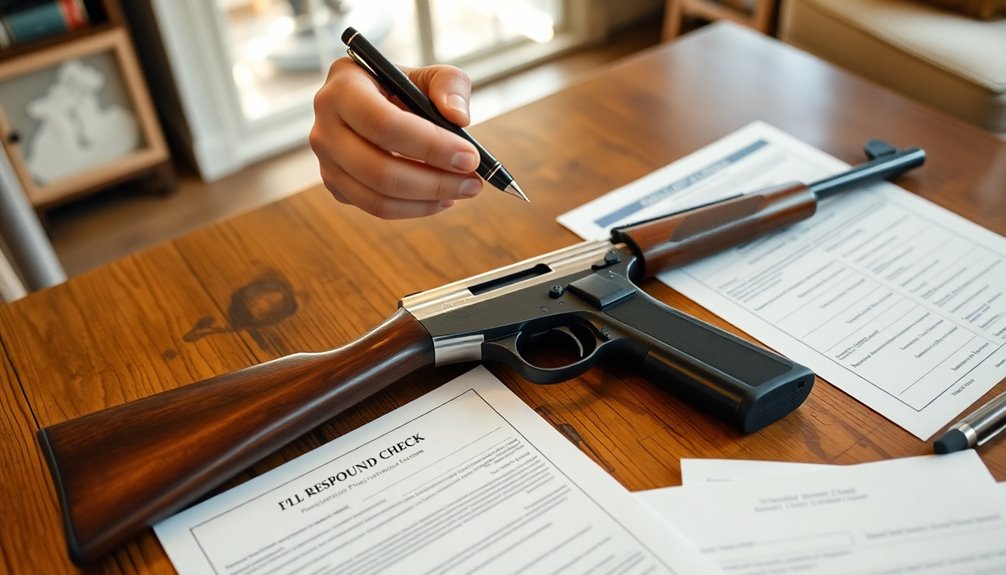Selling a firearm legally means you must know the regulations in your state. Start by verifying the buyer's eligibility, especially regarding their age and criminal record. Even if it's not a requirement, conducting a background check is highly recommended. Use a detailed Bill of Sale to document the transaction, which provides legal protection. Consider using an FFL dealer for added security and compliance. Always perform sales in safe, public locations and keep track of local laws to remain informed. Stick around for more insights that can help you navigate this process smoothly and avoid potential legal issues.
Understanding Firearm Sales Regulations
When selling a firearm, it's crucial to understand the regulations that govern these transactions.
Federal law requires licensed dealers to conduct background checks on buyers through the National Instant Criminal Background Check System (NICS) for all firearm sales. As an individual seller, you must verify the buyer's eligibility, since you can't sell to anyone with felony convictions or certain mental health issues. Additionally, having a clear understanding of payment terms can help facilitate a smooth transaction process. Regularly reviewing financial health is important to ensure you are aware of any potential costs related to the sale.
Remember, gun laws vary by state; some require background checks for private sales while others don't. It's wise to draft a bill of sale to document the transaction, even if not mandatory in your state.
Finally, make sure you're aware of age restrictions—buyers must be 21 for handguns and at least 18 for rifles and shotguns. Additionally, understanding the importance of expense categorization can help ensure that any associated costs of selling firearms are accurately tracked for tax purposes.
State-Specific Legal Requirements
When selling a firearm, you need to be aware of your state's specific laws.
Some states require background checks for private sales, while others don't, so knowing these regulations is vital for compliance. Additionally, verifying the eligibility of your buyer is important to avoid legal trouble and guarantee a safe transaction. Utilizing reliable budgeting tools can help ensure you manage the financial aspects of the sale responsibly. Consider using a tool like YNAB (You Need A Budget) to aid in tracking your spending and savings related to the sale. It's also wise to set up payment alerts to remind you of any associated fees or deadlines that may arise during the transaction.
Local Laws Overview
Understanding local laws is essential for anyone looking to sell a firearm legally, as each state has its own unique regulations.
Some states require background checks for private sales, while others don't. For instance, in California, private sellers must work with licensed dealers for background checks, but Georgia allows private sales without this requirement.
You need to verify the buyer meets eligibility criteria, like age limits and absence of felony convictions.
While not all states mandate documentation for private sales, keeping a bill of sale can protect you legally.
Additionally, local laws may impose waiting periods or require permits for firearm transfers, so stay informed about your state's specific regulations to avoid legal issues.
Eligibility Verification Essentials
Eligibility verification is essential for a smooth and legal firearm sale. Start by confirming the buyer's age, residency, and criminal record, as federal law prohibits sales to individuals with specific disqualifications.
While some states don't require private sellers to conduct background checks, it's wise to do so to comply with local laws and avoid legal issues. Always check the buyer's identity using valid identification, like a driver's license, to ascertain they're eligible to purchase and possess a firearm.
Additionally, familiarize yourself with state-specific laws, as they may impose further restrictions or requirements.
Finally, maintain a record of the sale, including a bill of sale with the buyer's details, to protect yourself from future disputes.
Importance of Buyer Eligibility
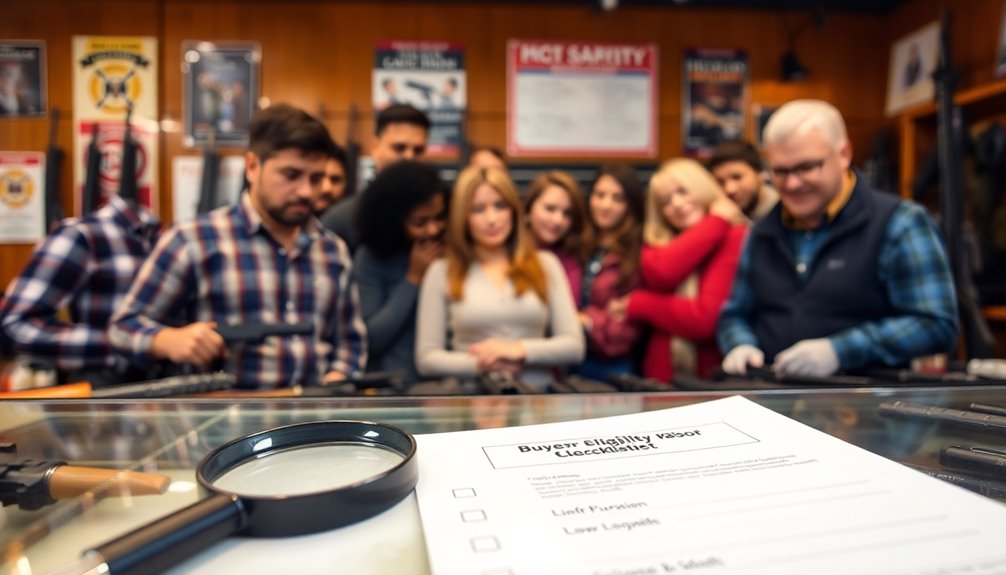
Verifying buyer eligibility is essential for anyone selling a firearm. As a seller, you must verify that your buyer meets legal age requirements—18 for rifles and shotguns, and 21 for handguns.
It's illegal to sell to anyone intoxicated or barred from ownership due to criminal convictions or mental health issues. Conducting a background check is imperative; while licensed dealers are required to use the National Instant Criminal Background Check System (NICS), private sellers should also consider it. Additionally, confirming the buyer's residency status and verifying they're not from a state with stricter regulations is crucial for compliance. Utilizing automated bill payment notifications can help you keep track of any related expenses during the selling process. Maintaining documentation, such as a bill of sale with the buyer's information, protects you from potential legal repercussions and verifies a smooth transaction. Moreover, being aware of sustainable and ethical shopping practices can enhance your overall selling experience. To further streamline the transaction process, consider using an app that offers receipt scanning technology to keep your financial records organized and accurate.
Conducting Background Checks
Verifying the buyer's eligibility doesn't stop with just checking their age or residency. Conducting background checks is essential, particularly in private sales where requirements can vary by state.
While federal law mandates checks for licensed dealers, many states don't require them for private transactions. However, you're still responsible for ensuring the buyer can legally own a firearm, reducing your liability risks. Utilizing budget apps can help you efficiently track any associated costs of conducting these checks. Additionally, implementing automated features in your expense tracking can streamline your financial management process.
If your state mandates background checks for private sales, consider using a Federal Firearms License (FFL) dealer to facilitate the transaction. They'll utilize the National Instant Criminal Background Check System (NICS) to verify criminal records and mental health disqualifications.
This extra step not only protects you but also helps keep firearms out of the hands of those who might misuse them. Additionally, prioritizing ethical practices in your transactions ensures a responsible approach to firearm sales within your community.
Selling Methods Overview
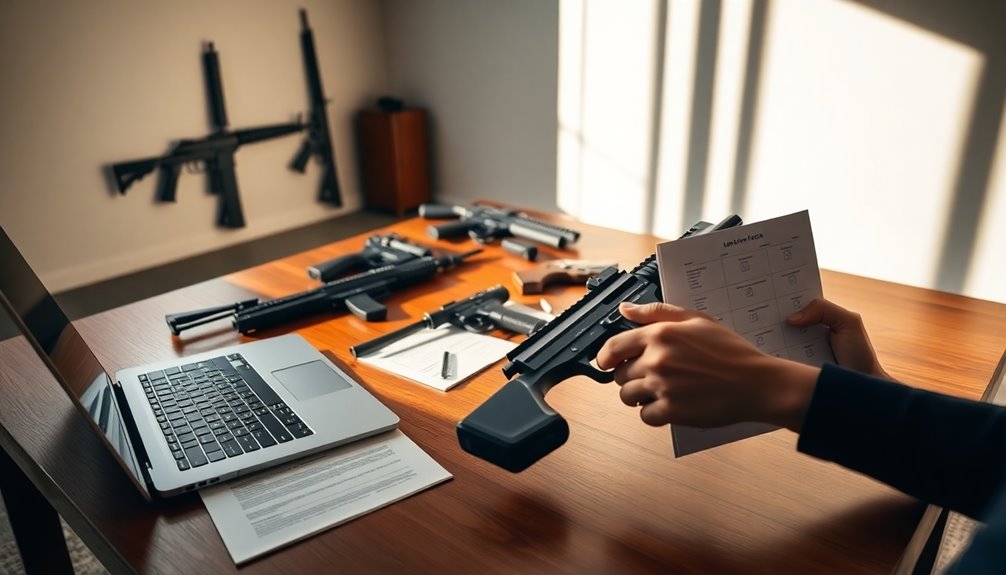
When you're ready to sell a firearm, understanding your options can make a significant difference in how smoothly the process goes. You can sell a gun through online platforms like Gunbroker and Armslist, or visit local gun shops for assistance with transfers.
Private sellers often achieve better returns compared to pawn shops, but remember that proper buyer verification is essential to minimize risks. Local sheriff's offices or gun clubs can offer guidance on legal sales. Additionally, consider utilizing loyalty programs to maximize potential benefits from your sales transactions, as repeat customers can significantly boost your revenue and enhance the selling experience.
Always document the sale with a Bill of Sale, noting the firearm specifics and both parties' signatures for legal protection. Engaging in community forums can also provide valuable insights on safe selling practices and traversing the legal landscape of firearm sales. Additionally, it's important to track performance metrics to ensure a successful transaction and understand buyer engagement.
Utilizing Gun Shows
When you attend gun shows, it's essential to know your local regulations regarding firearm sales, as these can differ widely.
These events also provide great networking opportunities, connecting you with other sellers and potential buyers.
Local Regulations Awareness
Understanding local regulations is crucial for anyone looking to sell a firearm at a gun show. Before you engage in any sales, make certain to:
- Verify if background checks are required for private sales.
- Check the gun show organizers' rules regarding individual sales.
- Keep detailed records of all transactions, including buyer information.
Many states impose specific laws that could affect your sale, so familiarize yourself with these local regulations.
Additionally, some gun shows may have stricter rules than state laws, so it's imperative to stay informed.
Utilizing gun shows can also connect you with licensed dealers who can help guarantee compliance.
Being aware of these factors will protect you from potential legal troubles down the line.
Networking Opportunities Available
Selling firearms at gun shows not only requires a solid grasp of local regulations but also opens up valuable networking opportunities.
These events let you interact directly with potential buyers, facilitating immediate transactions while ensuring compliance with the law. You'll find FFL dealers present, ready to assist with background checks, making it easier for you to verify buyer eligibility.
Showcasing your firearms to a targeted audience increases your chances of finding serious buyers, especially for unique or collectible items.
Plus, the community atmosphere fosters connections with fellow firearm enthusiasts, offering insights into market trends, pricing, and legal considerations.
Online Selling Platforms
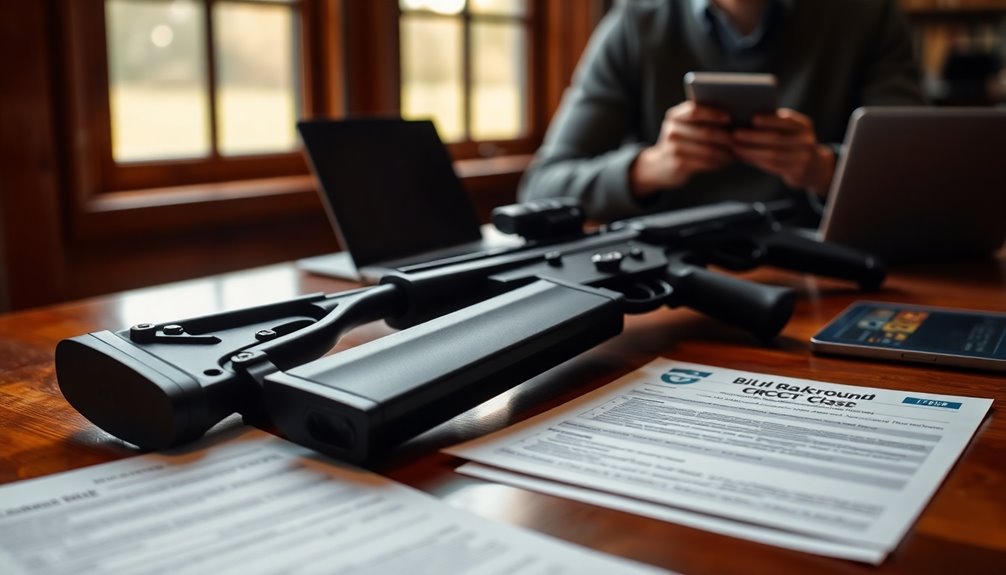
While traversing the landscape of online firearm sales, you'll find that platforms like Gunbroker and Armslist are specifically designed to help you connect with potential buyers.
These online selling platforms not only expand your reach but also guarantee you meet your legal responsibilities.
Here are a few tips to keep in mind:
- Verify the buyer's eligibility to own firearms.
- Familiarize yourself with your state's regulations on online sales.
- Utilize platforms that facilitate background checks.
Documentation and Record Keeping
When selling a firearm, creating a detailed bill of sale is essential for clear documentation.
You should keep copies of all transaction-related documents to protect yourself in case of disputes.
Maintaining accurate records not only guarantees legality but also fosters transparency throughout the sale process.
Bill of Sale Essentials
To guarantee a smooth and legal transaction, a well-crafted bill of sale is essential when transferring ownership of a firearm.
This document not only serves as proof of the sale but also fulfills legal requirements. Make sure to include:
- The date of the transaction
- Firearm details: make, model, serial number, and color
- Buyer's personal information: name, address, phone number, email, and a copy of their ID
Both you and the buyer should sign the bill of sale to solidify the agreement and protect against future legal issues.
While Texas law doesn't mandate formal documentation for private sales, maintaining a bill of sale is highly recommended for accountability and a solid paper trail.
Record Keeping Best Practices
Creating a bill of sale is just the first step in ensuring a smooth firearm transaction; keeping thorough records is equally important.
Always retain copies of the bill of sale, the buyer's identification, and any related correspondence. This establishes a clear paper trail for future legal inquiries.
Make sure both you and the buyer sign the bill of sale to validate the agreement and confirm ownership transfer.
For added protection, collect the buyer's personal information, such as their name, address, and contact details, to enhance your record keeping.
Using a standard template for bills of sale can streamline your documentation practices, ensuring you comply with local and state regulations and safeguarding both parties involved in the transaction.
Retaining Transaction Documentation
While it's important to draft a bill of sale, retaining thorough transaction documentation is just as crucial for protecting yourself in a firearm sale.
Keeping accurate records can shield you from potential disputes down the line. Here's what you should retain:
- A copy of the bill of sale, detailing the firearm's make, model, serial number, and transaction date.
- The buyer's personal information, including name, address, phone number, email, and identification.
- Any additional transaction-related documents, like communications or agreements.
Using a standard template guarantees consistency and helps you meet legal obligations.
Plus, familiarize yourself with local laws regarding documentation to avoid legal complications.
Proper transaction documentation is fundamental for your peace of mind.
Creating a Bill of Sale
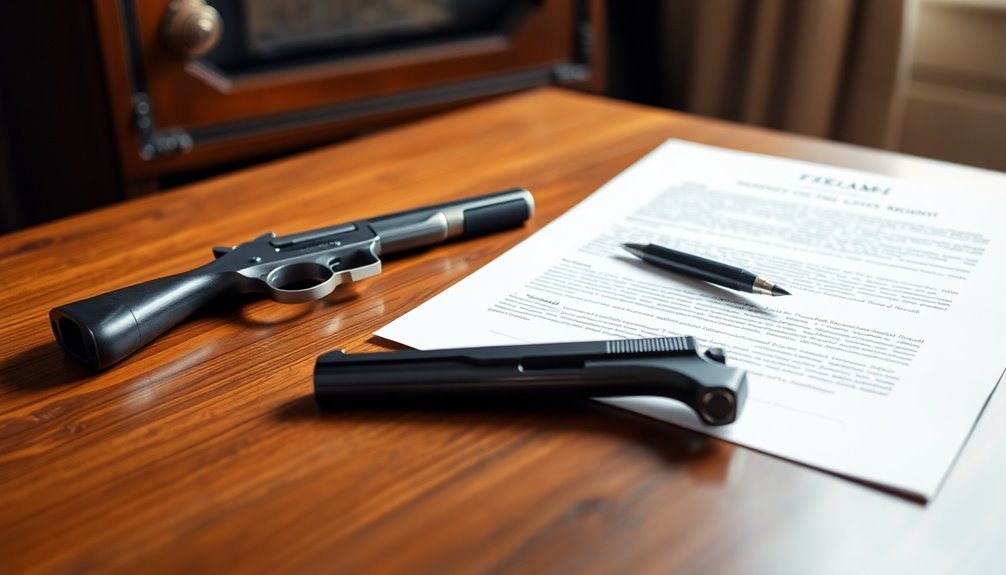
When selling a firearm, it's essential to draft a Bill of Sale that clearly outlines the details of the transaction.
Include the transaction date, firearm make, model, serial number, and color to maintain a clear record. Both you and the buyer should sign the Bill of Sale to acknowledge the terms, offering legal protection for both parties.
Collect the buyer's personal information, such as their name, address, and a copy of their ID, to guarantee accountability and compliance with legal requirements.
It's also wise to retain a copy of the Bill of Sale for your records, as it serves as proof of the transaction.
Utilizing a standard template can streamline the process and guarantee consistency across your sales.
Assessing Firearm Value
Understanding how to evaluate the value of a firearm is essential for both sellers and buyers, as it guarantees a fair transaction.
To determine the fair market value, consider these factors:
- Consult resources like the Blue Book of Gun Values for pricing based on make, model, and condition.
- Evaluate unique features or historical significance, as these can greatly boost value.
- Analyze recent sales on platforms like Gunbroker or Armslist to benchmark your pricing.
Condition grading—mint, excellent, or good—can considerably influence the pricing, with better-preserved firearms commanding higher prices.
Risks of Private Sales
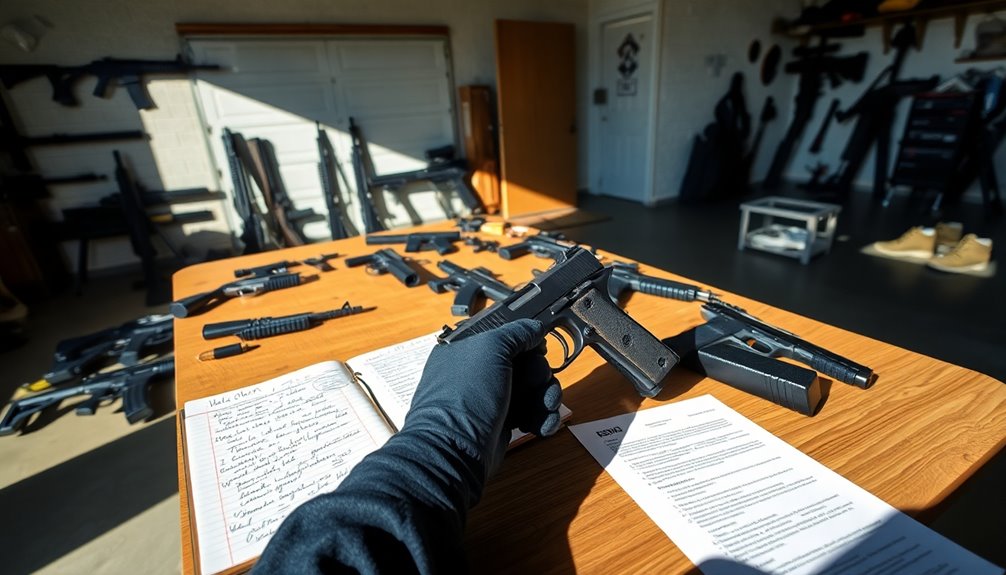
Selling a firearm privately can seem straightforward, but it comes with significant risks that you need to contemplate.
When you engage in private sales, you might unknowingly sell to someone prohibited from owning a firearm, like a felon or someone with mental health issues. Many states don't require background checks for private transactions, heightening that risk. You're responsible for verifying the buyer's age and eligibility, and failing to do so can lead to legal repercussions.
Additionally, without proper documentation, like a bill of sale, you complicate your legal standing if disputes arise.
Ultimately, unfamiliarity with local laws can result in trouble, as some jurisdictions impose stricter regulations than federal laws. Always stay informed to protect yourself.
Safety Considerations for Transactions
To guarantee a safe transaction, always choose a public place or a designated gun transaction location for meeting the buyer. This guarantees safety for both you, the gun seller, and the buyer.
Here are a few key steps to enhance safety:
- Verify the buyer's identity by checking their government-issued ID.
- Keep a detailed Bill of Sale, documenting the firearm specifics and both parties' signatures.
- Consider using an FFL dealer for added security and compliance with background checks.
If required by state law, inform local law enforcement about the sale.
Taking these precautions not only protects you legally but also fosters a sense of accountability and transparency in your firearm transactions.
Post-Sale Responsibilities
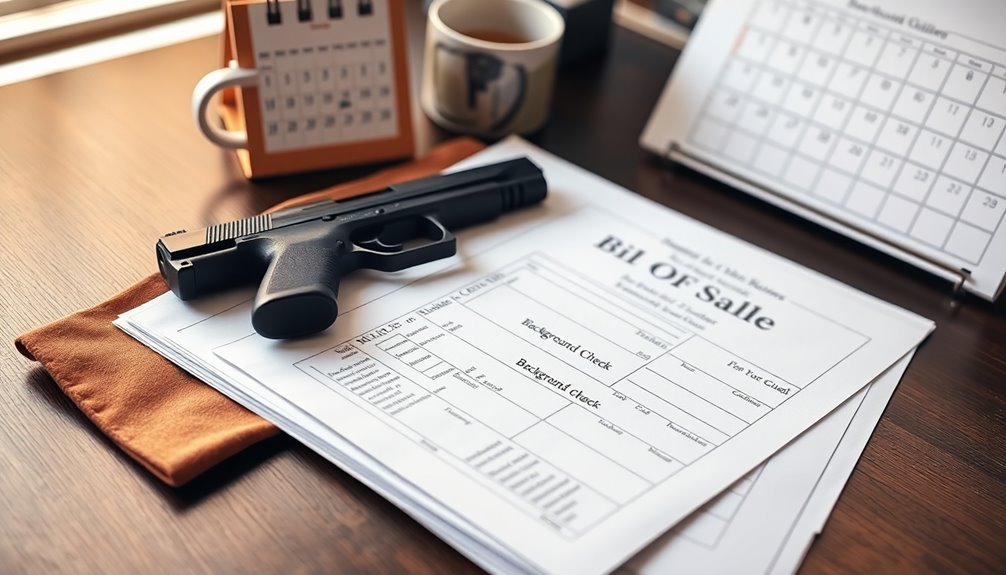
After selling a firearm, you need to keep a copy of the Bill of Sale for your records, as it's essential proof of the transaction.
Check your local laws to see if you have to report the sale to authorities; some states require this step.
Keeping detailed documentation helps guarantee you're compliant and protects you from potential legal issues down the line.
Retain Transaction Documentation
Once the sale is complete, it's crucial to retain thorough transaction documentation to protect yourself legally.
A well-documented sale can save you from potential headaches later on.
Here's what you should keep:
- A bill of sale detailing the firearm's make, model, serial number, and transaction date.
- Buyer's personal information, including their name, address, phone number, and a copy of their ID.
- A copy of the bill of sale and any related documentation for at least five years.
Report Sales When Necessary
Retaining proper documentation is just the first step; understanding your reporting obligations is equally important.
In many states, you're required to report the sale of a firearm to local authorities, so it's vital to check your specific state laws regarding these obligations. Keep a copy of the Bill of Sale to show compliance if needed later.
Some jurisdictions have particular forms or processes for reporting firearm sales, so familiarize yourself with them to guarantee you're following legal guidelines correctly.
If state law requires it, inform local law enforcement about the sale; this adds legal protection for both you and the buyer.
Building a Support Network
Building a strong support network is essential for anyone looking to sell firearms legally. Connecting with the right people can help you navigate legal requirements and improve your selling experience.
Here are some ways to build your network:
- Join organizations like Youngsville Gun Club for resources and guidance.
- Attend local gun shows to meet buyers and fellow sellers, sharing knowledge and experiences.
- Engage in online forums focused on firearms to discuss regulations and safety concerns.
Ethical Selling Practices
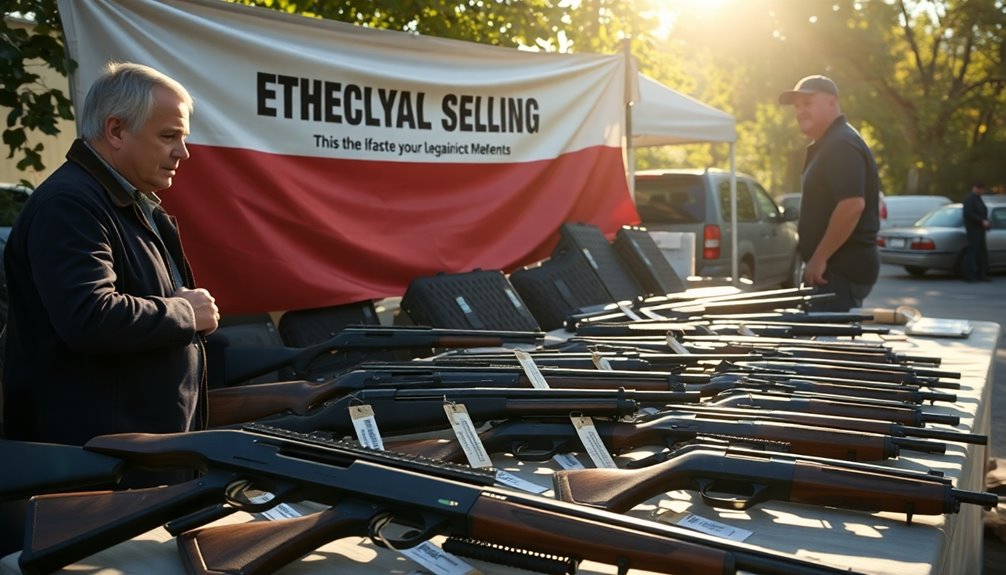
When selling a firearm, it's crucial to prioritize ethical practices to guarantee a safe and responsible transaction.
First, always verify the buyer's eligibility by checking their ID and ensuring they're of legal age in your state. Conduct a background check through the National Instant Criminal Background Check System (NICS) to avoid selling to individuals prohibited from firearm ownership.
Be transparent by providing complete and honest information about the firearm's condition, history, and any modifications.
Utilize a Bill of Sale that documents the transaction details to protect both you and the buyer legally.
Finally, educate the buyer on safe storage practices and responsible gun ownership, promoting ethical use and reducing the risk of misuse after the sale.
Conclusion
In steering through the world of firearm sales, you're not just ensuring compliance; you're also fostering a culture of responsibility and trust. By understanding regulations, conducting background checks, and prioritizing safety, you're not only protecting yourself but also contributing to a safer community. Remember, selling a firearm isn't just a transaction—it's a commitment to ethical practices that resonate beyond the sale. So, approach each step with care, and let your integrity shine through every interaction.

